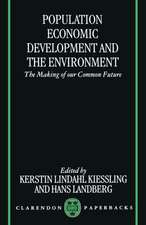London Calling: The Middle Classes and the Remaking of Inner London
Autor Tim Butler, Garry Robsonen Limba Engleză Paperback – 31 iul 2003
| Toate formatele și edițiile | Preț | Express |
|---|---|---|
| Paperback (1) | 198.57 lei 43-57 zile | |
| Bloomsbury Publishing – 31 iul 2003 | 198.57 lei 43-57 zile | |
| Hardback (1) | 714.68 lei 43-57 zile | |
| Bloomsbury Publishing – 31 iul 2003 | 714.68 lei 43-57 zile |
Preț: 198.57 lei
Nou
Puncte Express: 298
Preț estimativ în valută:
38.00€ • 39.53$ • 31.37£
38.00€ • 39.53$ • 31.37£
Carte tipărită la comandă
Livrare economică 14-28 aprilie
Preluare comenzi: 021 569.72.76
Specificații
ISBN-13: 9781859736289
ISBN-10: 1859736289
Pagini: 224
Ilustrații: bibliography, index
Dimensiuni: 138 x 216 x 13 mm
Greutate: 0.38 kg
Ediția:New.
Editura: Bloomsbury Publishing
Colecția Berg Publishers
Locul publicării:London, United Kingdom
ISBN-10: 1859736289
Pagini: 224
Ilustrații: bibliography, index
Dimensiuni: 138 x 216 x 13 mm
Greutate: 0.38 kg
Ediția:New.
Editura: Bloomsbury Publishing
Colecția Berg Publishers
Locul publicării:London, United Kingdom
Caracteristici
Also available in hardback, 9781859736234 £50.00 (August, 2003)
Notă biografică
Garry Robson Tim Butler is Reader in Urban Sociology at the University of East London.
Cuprins
Chapter 1 Marking out the middle classes in a global cityChapter 2 Gentrification: a middle-cass coping strategy?Chapter 3 Spatial and strategic middle-class activity in the CityChapter 4 Mapping the neighbourhoodsChapter 5 A Class in and for itself?Chapter 6 Home and householdChapter 7 Children, schooling and social reproductionChapter 8 Making sense of 21st century gentrificationChapter 9 ConclusionsBibliography
Recenzii
'There is a great deal to admire in this book, not least the brave attempt to produce a theoretically informed analysis based on a large number of personal testimonies by middle-class occupants and an insistence on not only the importance of understanding lived experiences but also their social and geographical variety.'Urban Studies Journal'Tim Butler has already established himself as the foremost British sociologist of gentrification. Butler and Robson take this a step further by presenting a fascinating account of how London's middle classes are adapting to the challenge of living in a global city. This is a readable, lively, yet robust account of the contemporary urban change.'Mike Savage, Department of Sociology, Manchester University'London Calling is a fascinating and illuminating book about the changing role of the middle classes in inner London and the extent of their integration in local communities. It is theoretically very well grounded and empirically rigorous
This work contributes to the expanding discourse about international broadcasting during the Cold War. Webb (Open Univ., UK) draws on his own published articles and the pioneering work of Asa Briggs to examine the BBC's External Services in the decade after the end of WW II. Attempts to broadcast to countries behind the Iron Curtain faced constant jamming from the Soviets. Broadcasts to other parts of the world proved expensive during a period of British austerity and imperial decline. The book's best chapters focus on the BBC's work during the Hungarian Revolution and the Suez Crisis. The Soviets ceased to jam in 1956 as part of Khrushchev's reforms. BBC coverage of events in Hungary garnered wide praise, including from British government officials. Suez proved a different story. The Foreign Office sought to undermine the BBC's editorial independence during this unfolding debacle, pressure that the BBC managed to resist, though not without compromise. After Suez, programming to the Middle and Far East increased, but External Services abolished broadcasts in a number of languages, including Dutch and Norwegian, and vastly curtailed efforts in French, German, Italian, and Spanish.
This work contributes to the expanding discourse about international broadcasting during the Cold War. Webb (Open Univ., UK) draws on his own published articles and the pioneering work of Asa Briggs to examine the BBC's External Services in the decade after the end of WW II. Attempts to broadcast to countries behind the Iron Curtain faced constant jamming from the Soviets. Broadcasts to other parts of the world proved expensive during a period of British austerity and imperial decline. The book's best chapters focus on the BBC's work during the Hungarian Revolution and the Suez Crisis. The Soviets ceased to jam in 1956 as part of Khrushchev's reforms. BBC coverage of events in Hungary garnered wide praise, including from British government officials. Suez proved a different story. The Foreign Office sought to undermine the BBC's editorial independence during this unfolding debacle, pressure that the BBC managed to resist, though not without compromise. After Suez, programming to the Middle and Far East increased, but External Services abolished broadcasts in a number of languages, including Dutch and Norwegian, and vastly curtailed efforts in French, German, Italian, and Spanish.

























